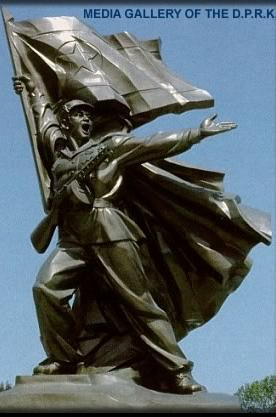
Don’t Dare Escape!
Perhaps the saddest place on the planet is the Democratic Peoples Republic of Korea. It is an almost completely closed society, and yet a few do manage to escape. Soyoung Ho has a useful account of an interview with a man who escaped from the workers’ paradise in Slate.
Whang’s lined face made him look older than 35 years. He had succeeded in defecting on his third attempt in September 2003. From China he went to a third country with the help of a broker, paid for with his earnings from a clam-shell-processing factory and money loaned to him by his relatives, finally arriving in South Korea. He almost died a few times; he was caught by Russian and Chinese officers; and he was returned and detained by the North Korean KGB on at least one occasion. One time he was released from a labor camp after he faked an injury (the government lacks the resources to treat internees). He even ate a piece of nail once he made it into China, hoping that when he was hit, his intestine or colon would burst, and he would be sent to a hospital, from where it would be easier to escape. Ironically, no one brutalized him.
I’ve read and seen on British television much sadder accounts. The suffering of the North Koreans and the yearning to escape to a completely unknown world that simply has to be better than communist tyranny is heart breaking. Yet they risk the terrible fate that awaits those who are caught, as this short article in The Chosun Ilbo describes: “Mother of Executed Defector Criticizes Gov.” Other articles have described captured defectors who were simply tied to trees in the middle of villages and allowed to die of starvation and thirst; anyone who took pity on them and brought them water was executed.
One moving part of the interviews I saw with defectors was the description of what people quietly whisper in the most totalitarian state in the world.
If you get across the border and make it into China, avoid the police, who will send you back. To find people who will help you, look for a building with a simple sign on it.
They would write the sign hurriedly in the dirt and then cover it over:
I’m not a believer, but I am moved by the decency of simple and humble Chinese people who would risk so much to help complete strangers. The world would be a much better place with more such righteous people.
UPDATE: The Washington Post on Saturday, March 26 ran an eloquent essay on “Toxic Indifference to North Korea,” by Abraham Cooper. As he writes,
Since 2002, defectors among the flood of refugees from North Korea have detailed firsthand accounts of systematic starvation, torture and murder. Enemies of the state are used in experiments to develop new generations of chemical and biological weapons that threaten the world. A microcosm of these horrors is Camp 22, one of 12 concentration camps housing an estimated 200,000 political prisoners facing torture or execution for such “crimes” as being a Christian or a relative of someone suspected of deviation from “official ideology of the state.” Another eyewitness, Kwon Hyuk, formerly chief manager at Camp 22, repeated to me what he asserted to the BBC: “I witnessed a whole family being tested on suffocating gas and dying in the gas chamber. . . . The parents were vomiting and dying, but until the very last moment they tried to save kids by doing mouth-to-mouth breathing.”










I’m not a believer either, but I’m thankful for the globally dispersed institutions, of which religion is one, that comprise civil societies. They make up in all the areas where governments are doomed to fail.
BR: “I’m not a believer either, but I’m thankful for the globally dispersed institutions, of which religion is one, that comprise civil societies. They make up in all the areas where governments are doomed to fail.”
I agree with Brian (and Tom); though we must also keep in mind the paradoxical point that they also represent special interest groups that, when working to manipulate government institutions in their favor, cause great harm.